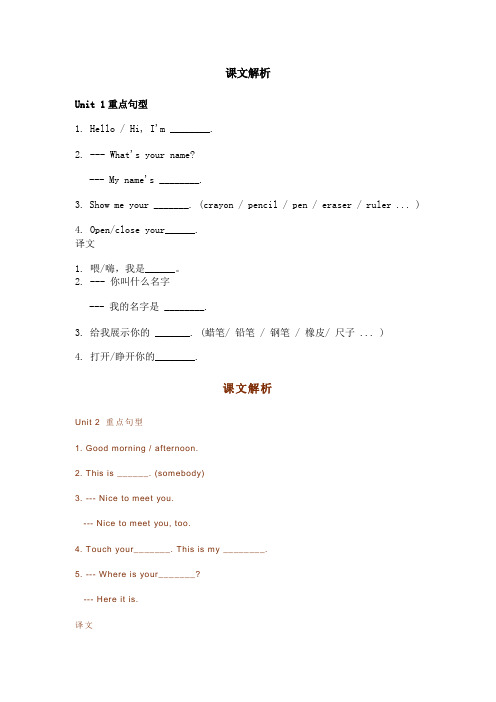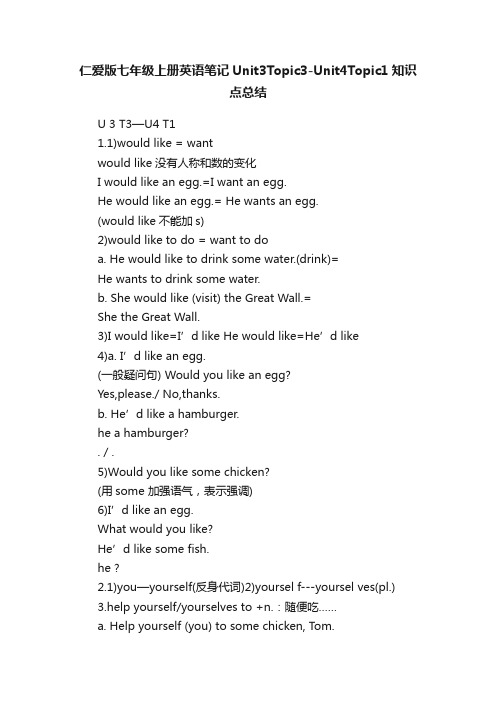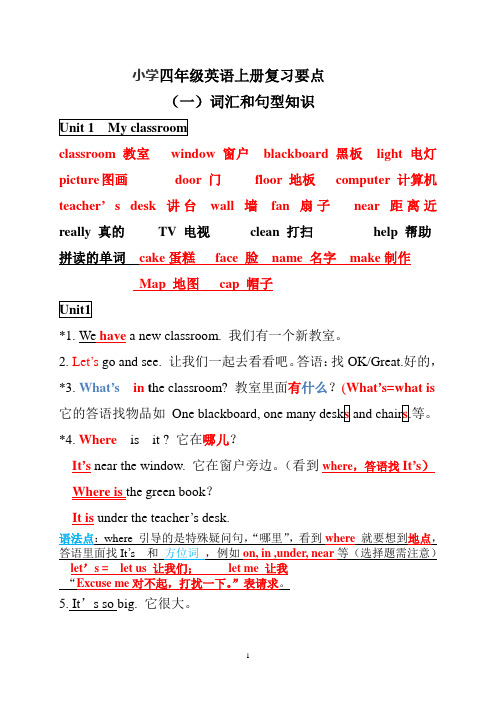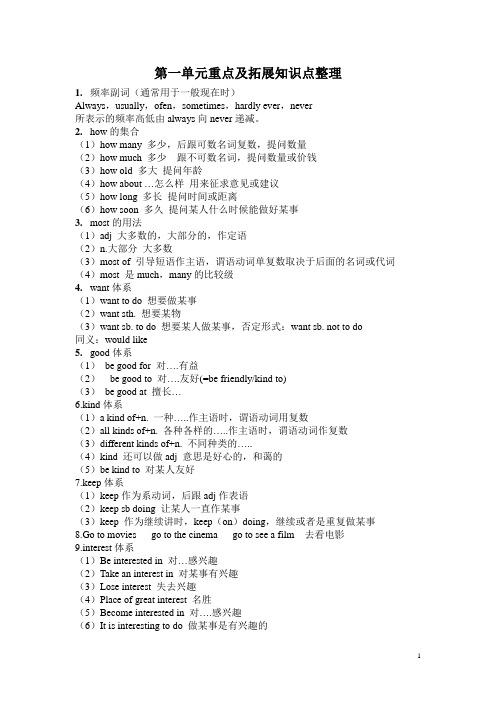英语unit123知识点总结
- 格式:doc
- 大小:319.00 KB
- 文档页数:16

课文解析Unit 1重点句型1. Hello / Hi, I'm ________.2. --- What's your name?--- My name's ________.3. Show me your _______. (crayon / pencil / pen / eraser / ruler ... )4. Open/close your______.译文1. 喂/嗨,我是______。
2. --- 你叫什么名字--- 我的名字是 ________.3. 给我展示你的 _______. (蜡笔/ 铅笔 / 钢笔 / 橡皮/ 尺子 ... )4. 打开/睁开你的________.课文解析Unit 2 重点句型1. Good morning / afternoon.2. This is ______. (somebody)3. --- Nice to meet you.--- Nice to meet you, too.4. Touch your_______. This is my ________.5. --- Where is your_______?--- Here it is.译文1. 早上好/下午好2. 这位是_____ (某人)3. --- 见到你很高兴。
---见到你也和高兴。
4. 摸你的_______. 这是我的________.5. --- 你的_______在哪里?--- 这里.课文解析Unit 3重点句型1. --- How are you?--- Fine, thank you. / Very well, thanks.2. Let's paint. (Let's go to school)3. Stand up. / Sit down.译文1. ---你好吗?--- 我很好,谢谢你/我很好,谢谢你.2. 让我们一起画画. (让我们一起去学校)3. 站起来. /坐下.课文解析Unit 4重点句型1. Look, I have a / an ________.2. Act like a______. (animals)3. --- May I have a look?--- Sure.4. --- Here you are.--- Thank you.--- You're welcome.译文1. 看,我有一个 ________。

仁爱版七年级上册英语笔记Unit3Topic3-Unit4Topic1知识点总结U 3 T3—U4 T11.1)would like = wantwould like没有人称和数的变化I would like an egg.=I want an egg.He would like an egg.= He wants an egg.(would like不能加s)2)would like to do = want to doa. He would like to drink some water.(drink)=He wants to drink some water.b. She would like (visit) the Great Wall.=She the Great Wall.3)I would like=I’d like He would like=He’d like4)a. I’d like an egg.(一般疑问句) Would you like an egg?Yes,please./ No,thanks.b. He’d like a hamburger.he a hamburger?. / .5)Would you like some chicken?(用some 加强语气,表示强调)6)I’d like an egg.What would you like?He’d like some fish.he ?2.1)you—yourself(反身代词)2)yoursel f---yoursel ves(pl.)3.help yourself/yourselves to +n.:随便吃……a. Help yourself (you) to some chicken, Tom.b. Help yourselves (you) to some chicken, kids.4.1)可数名词[C]:有单数和复数的形式.2)不可数名词[UC]:一般没有复数的形式.3)常见的不可数名词有:milk,rice,fish(鱼肉),chicken(鸡肉),(apple/orange) juice,water,bread5.fish:1)作为“鱼” , 是可数名词.fish—fish(pl.)2)作为“鱼肉”, 是不可数名词.some fish6.chicken:1)作为“鸡” , 是可数名词.a chicken2)作为“鸡肉”, 是不可数名词.some chicken7.some + n.(pl.),some+ [UC]some eggssome fish/chicken/milk/apple juice/rice8.---Help yourselves.---Thank you.9.---Would you like…? ---Yes, please. /No, thanks.10.What/How about +sb(宾格)/sth?What about him/her/some milk?11.All right.行,好吧(表示对别人的建议表示赞同)---I’d like some rice and chicken.---All right./doc/6e6981861.html,k for me.13.Me,too.14.表示建议:---What about …? ---Good idea.15.an ideaa good ideaHomework:1.I’d like a hamburger.(一般疑问句) a hamburger?(肯否回答) ./ .2.She’d like some orange juice.she ?3. , boys and girls.(随便吃些鸡肉吧)4.She likes it very much.(否)She it .5..(我想喝些牛奶).6.他们怎么样?Unit 3 T 3 Section B—D1.1)usually:70-80%,often:50-60%2)usually,often放在be之后,行为动词之前.I usually have breakfast at home.2.have…for breakfast/lunch/supper/dinner1)He usually has an egg and some milk for breakfast.2)We usually have some rice and chicken for supper.3.一日三餐前不加a/an/the,后不加s.What do you usually have for/ breakfast?4.1)He usually has some bread for lunch.What does he usually have for lunch?2)We usually have some juice and fish for dinner. usuallyfor dinner?5.have:1)有2)吃,喝:have milk/bread6.[UC]前面不加a/an/the,后不加s.He has / milk and/ bread for breakfast.7.What/How about +sb(宾格)/sth?8.with带着/有,(表示伴随关系)have chicken/fish with vegetables9.some rice10.three meals(餐):breakfast,lunch,supper/dinner11.food:[UC],食物的总称,作主语,谓语用单数.My favorite food is (be) chicken and fish.12.Chinese /English food13.wait(v.)—waiter(指人)(男服务员)---waitress(女服务员)14.take one’s orderMay I take your order?15.something to drink/eat1)修饰词如不定式(to do) ,形容词修饰something时,放在something之后.2)something:某事(肯定句)anything:任何事(否/疑问)nothing:没有什么事(表否定意思的陈述句)3)Would you like +something?Would you likesomething to eat ?16.[UC]表示数量的表达法:1)a glass of apple juice/watera bag of rice /milk2)a glass of apple juice---two/some glasses of apple juice3) a bag of milk---five bags of milk17.wait/just a moment18.Let me see.让我想一想.I see. 我明白了.19.1)Would you like some vegetables?2)some vegetables/rice20.something to drink21.banana juice----Section C1.eat out2.eat---eating(现在分词)3.would like to doWould you like to have (have) dinner with me?4.have / breakfast/lunch/supper/dinner5.with sb(宾格)6.Would you like to have lunch with him?7.Yes, I’d like/love to.(to不能省略)8.1)May/can I help you?=What can I do for you?2)情态动词may/can/could+动原May I help (help) you?9.sir—madam(对应词)10.What would you liketo eat (eat)?11.Why not+动原? =Why don’t you +动原?Why not study (study) with me? = Why don’t you study with me?12.表示建议:1)What about…? 2)Why not…?肯定回答:Good idea.13.Here you are.14.---Would you like sth to drink?---Yes,please./No,thanks.Section D1.in+地点: in China2.many+n(pl.)many friends3.1)all,bothall指三者或三者以上“都”both指两者“都”2)all,both放在be之后,行为动词之前They are all students.We all like school.4.be kind to sbThe teacher is kind to us.5.have dinner with them6.such as +若干例子7.Sichuan food8.be glad to do sthObama is glad to visit (visit) the Great Wall.9.1)here,there是介词,前不加介词.2)be here/thereI’m glad to be (be) here.10.let sb do sthLet me (I) see (see).Homework:1.他晚饭通常吃什么?he usually2.你可以点菜了吗?3.Tom,为什么不随便吃些汉堡包呢,?,Tom?4.你想喝些什么东西吗?来两杯香蕉汁. Would you like.5.She’s glad (be) there.6.I’d like (work) with you.7.Would you like something (say)?8.Why not (tell) him about it.= him about it.9.他对我很友善.He .10.I usually have some rice for lunch. usually for lunch?1.---Do you like…?---Yes, I like …very much/a lot/a little. (No, I don’t like …at all.)Section D1.at / homeHe has a dog at home.2.it’s, its(它是)(它的)a cat. name’s Mimi.3.Tommy =T om4.Zhou Lan likes it a lot.= Zhou Lan likes it very much. (否)Zhou Lan doesn’t li ke it at all.5.some,anyShe has some pets.(否)She doesn’t have any pets.(疑问)Does she have any pets?6.1)人称代词:主格---宾格I—me,you-you,he-him,she-her,it-itwe-us,they-them2)形物代—名物代my-mine,your-yours,his-his,her-hers,its-its,our-ours,their-theirsThis is a girl. name is Lily. is twelve. We like .(Her,She,her) Unit 4 T1 Section A1.What can I do for you?=Can/May I help you?2.madam---sir(对应词)3.want to do = would like to do1)She wants to have milk and bread.=She would like to have milk and bread.2)Would you like a glass of apple juice?=Do you want a glass of apple juice?3)Would she like some vegetables?=Does she want any vegetables?4.clothes:衣服的总称,复数名词,作主语时,谓语用复数形式。

人教版六年级上册英语1-3单元知识归纳Unit 1:In the first unit, we learn about personal information and greetings. We learn how to introduce ourselves and ask others for their names. We also learn about nationality and how to say where we come from. Additionally, we learn how to greet others and how to say goodbye. We practice simple conversations using these phrases and learn how to express basic needs and preferences.Unit 2:In the second unit, we focus on classroom objects and school subjects. We learn the names of common objects found in a classroom such as books, pens, desks, and chairs. We also learn the names of different school subjects like math, science, and English. Additionally, we learn how to talkabout our schedule or timetable and express what subjects we have on certain days.Unit 3:The third unit is all about hobbies and free time activities. We learn how to talk about our favorite hobbies and activities. We learn vocabulary related to sports, music, and games. We also learn how to express our likes anddislikes using "I like" and "I don't like" phrases. Moreover, we learn how to ask others about their hobbies and engage in simple conversations about our common interests.Throughout these units, we practice listening, speaking, reading, and writing skills. We engage in various activities such as role-plays, pair work, and group discussions to enhance our communication abilities. By the end of these units, we should be able to confidently introduce ourselves, communicate basic personal information, talk about school life, and discuss hobbies and interests.。

小学四年级英语上册复习要点(一)词汇和句型知识classroom 教室window 窗户blackboard 黑板light 电灯picture图画door 门floor 地板computer 计算机teacher’s desk 讲台wall 墙fan 扇子near 距离近really 真的TV 电视clean 打扫help 帮助拼读的单词cake蛋糕face 脸name 名字make制作Map 地图cap 帽子*1. We have a new classroom. 我们有一个新教室。
2. Let’s go and see. 让我们一起去看看吧。
答语:找OK/Great.好的,*3. What’s in t he classroom? 教室里面有什么?(What’s=what is它的答语找物品如等。
*4. Where is it ? 它在哪儿?It’s near the window. 它在窗户旁边。
(看到where,答语找It’s)Where is the green book?It is under the teacher’s desk.语法点:where 引导的是特殊疑问句,“哪里”,看到where就要想到地点,答语里面找It’s 和方位词,例如on, in ,under, near等(选择题需注意)let’s = let us 让我们;let me 让我“Excuse me对不起,打扰一下。
”表请求。
5. It’s so big. 它很大。
*6. Let’s clean the classroom. 让我们一起打扫教室*7. Let me clean the windows. . 让我来擦窗户。
8. Let me help you . / Thank you . 让我来帮你。
/ 谢谢你。
9. This is the new classroom. 这是新教室。
The door is(单数)orange. 门是橙色的。

九年级英语unit123的知识点九年级英语Unit 1-3的知识点第一节: 语法知识点在九年级的英语课程中,Unit 1-3涵盖了丰富的语法知识。
其中,最常见的是现在进行时态。
现在进行时用来描述正在进行的动作。
例如,"I am eating dinner"意思是"我正在吃晚饭"。
此外,还有被动语态的使用。
被动语态用于强调动作的接受者,而不是动作的执行者。
例如,"The book is being read by me"意思是"这本书正在被我阅读"。
除此之外,我们还学习了一些其他的语法知识,如过去进行时、过去完成时等。
第二节:词汇知识点在Unit 1-3中,我们学习了很多新的词汇。
这些词汇包括了名词、动词、形容词和副词等不同词性。
例如,我们学习了很多关于家庭和朋友的词汇,如mother,father,sister,brother,friend 等。
此外,我们还学习了一些描述性词汇,如beautiful,interesting等。
通过学习这些词汇,我们能够更好地描述事物和人物。
第三节:阅读理解技巧阅读理解是英语学习中非常重要的一部分。
在Unit 1-3中,我们学会了一些有效的阅读理解技巧。
首先,我们要注重理解文章的主题句和段落大意。
通过抓住文章的重要信息,我们能够更好地理解文章的内容。
其次,我们要注意上下文的暗示和推测。
在阅读中,有时候我们需要通过上下文来推测一些词汇的意思。
最后,我们要善于使用词典和其他辅助工具来解决阅读中遇到的难点。
通过不断的阅读和练习,我们的阅读理解能力会不断提高。
第四节:听力技巧在九年级的英语学习中,我们还要提高我们的听力技巧。
在Unit 1-3中,我们学习了一些有关听力的技巧。
首先,我们要注意抓住关键词。
当我们听到关键词时,应该立即将其与自己已有的知识联系起来,以便更好地理解整个句子的含义。
第二,我们要注意上下文的线索。

第一单元重点及拓展知识点整理1.频率副词(通常用于一般现在时)Always,usually,ofen,sometimes,hardly ever,never所表示的频率高低由always向never递减。
2.how的集合(1)how many 多少,后跟可数名词复数,提问数量(2)how much 多少跟不可数名词,提问数量或价钱(3)how old 多大提问年龄(4)how about …怎么样用来征求意见或建议(5)how long 多长提问时间或距离(6)how soon 多久提问某人什么时候能做好某事3.most的用法(1)adj 大多数的,大部分的,作定语(2)n.大部分大多数(3)most of 引导短语作主语,谓语动词单复数取决于后面的名词或代词(4)most 是much,many的比较级4.want体系(1)want to do 想要做某事(2)want sth. 想要某物(3)want sb. to do 想要某人做某事,否定形式:want sb. not to do同义:would like5.good体系(1)be good for 对….有益(2)be good to 对….友好(=be friendly/kind to)(3)be good at 擅长…6.kind体系(1)a kind of+n. 一种…..作主语时,谓语动词用复数(2)all kinds of+n. 各种各样的…..作主语时,谓语动词作复数(3)different kinds of+n. 不同种类的…..(4)kind 还可以做adj 意思是好心的,和蔼的(5)be kind to 对某人友好7.keep体系(1)keep作为系动词,后跟adj作表语(2)keep sb doing 让某人一直作某事(3)keep 作为继续讲时,keep(on)doing,继续或者是重复做某事8.Go to movies go to the cinema go to see a film 去看电影9.interest体系(1)Be interested in 对…感兴趣(2)Take an interest in 对某事有兴趣(3)Lose interest 失去兴趣(4)Place of great interest 名胜(5)Become interested in 对….感兴趣(6)It is interesting to do 做某事是有兴趣的10.about体系(1)Adv 大约,差不多(2)介词在….周围,在….附近(3)表示关于….时,后接的内容比较普通,不太正式11.pretty体系(1)Adv 相当修饰形容词或者是副词(2)Adj 漂亮的;优美的12.try 体系(1)Try to do 努力做某事(2)Try doing 尝试做某事(3)Try ones best to do 尽某人最大努力做某事(4)Try on 试穿(5)Try 作为n 尝试,have a try 试一下12.shop体系(1)v.购物;买东西(2)n 商店相当于store13.some体系(1)一些;若干即可以修饰可数名词也可以修饰不可数名词(2)用于肯定句中或者是表示委婉客气请求的一般疑问句中14.may be与may beMaybe 是副词,可能;也许;大概通常位于句首May be 情态动词+动词原形可能是;也许是第二单元重点及拓展知识点整理1.matter体系(1)作n.时,意思为事情;问题;情况(2)v.要紧;关系重大,主要用于否定句中。
八年级上册英语123单元知识点Unit 1 Where did you go on vacation?一、重点单词。
1. anyone.- 用法:不定代词,意为“任何人”,常用于疑问句和否定句中。
例如:Did you meet anyone interesting on your vacation?(你在假期中遇到有趣的人了吗?)2. anywhere?- 用法:副词,意为“在任何地方;到任何地方”,常用于疑问句和否定句中。
例如:I can't find my keys anywhere.(我到处都找不到我的钥匙。
)3. wonderful.- 词性:形容词,意为“精彩的;绝妙的”。
例如:We had a wonderful time at the party.(我们在聚会上玩得很开心。
)4. few.- 用法:形容词,意为“不多;很少”,修饰可数名词复数,表示否定意义。
例如:There are few students in the classroom.(教室里几乎没有学生。
)- 对比:a few表示“一些;几个”,表示肯定意义。
例如:There are a few apples on the table.(桌子上有几个苹果。
)5. most.- 用法:- 形容词,意为“最多的;大多数的”。
例如:Most students like English.(大多数学生喜欢英语。
)- 副词,意为“最;非常”。
例如:This is the most beautiful flower in the garden.(这是花园里最漂亮的花。
)二、重点短语。
1. go on vacation.- 含义:去度假。
例如:They went on vacation last month.(他们上个月去度假了。
)2. stay at home.- 含义:待在家里。
例如:I stayed at home and watched TV yesterday.(我昨天待在家里看电视了。
七年级上册英语123单元短语总结Unit 1
My name's Gina
一、重点短语
1.telephone/phone number电话号码
2.first name=given name 名字
st name=family name 姓
4.middle school 中学
5.in China 在中国
6.my friend 我的朋友
7.a piece of paper 一张纸
Unit 2
This is my sister
一、重点短语
1.他的姐姐his sister
2.我的哥哥my brother
3.·…….的名字the name of...
4.祝你度过愉快的一天Have a good day!
5.一张··…..的照片a photo of...
6.in the next picture 在下一张照片里
7.in the first photo 在第一张照片里
Unit 3
Is this your pencil?
一、重点短语
1.pencil box 铅笔盒;文具盒
2.excuse me 劳驾;请原谅
3.what about(doing)sth...? ·…..怎么样
4.thank you for(doing)sth... 为··…..而感谢你(们)
5.Lost and Found 失物招领处
6.ID card 学生卡;身份证
7.ask...for...请求;恳求(给予)
8.a set of keys 一套钥匙。
U 3 T3—U4 T11.1)would like = wantwould like没有人称和数的变化I would like an egg.=I want an egg.He would like an egg.= He wants an egg.(would like不能加s)2)would like to do = want to doa. He would like to drink some water.(drink)=He wants to drink some water.b. She would like (visit) the Great Wall.=She the Great Wall.3)I would like=I’d like He would like=He’d like4)a. I’d like an egg.(一般疑问句) Would you like an egg?Yes,please./ No,thanks.b. He’d like a hamburger.he a hamburger?. / .5)Would you like some chicken?(用some 加强语气,表示强调)6)I’d like an egg.What would you like?He’d like some fish.he ?2.1)you—yourself(反身代词)2)yoursel f---yoursel ves(pl.)3.help yourself/yourselves to +n.:随便吃……a. Help yourself (you) to some chicken, Tom.b. Help yourselves (you) to some chicken, kids.4.1)可数名词[C]:有单数和复数的形式.2)不可数名词[UC]:一般没有复数的形式.3)常见的不可数名词有:milk,rice,fish(鱼肉),chicken(鸡肉),(apple/orange) juice,water,bread5.fish:1)作为“鱼” , 是可数名词.fish—fish(pl.)2)作为“鱼肉”, 是不可数名词.some fish6.chicken:1)作为“鸡” , 是可数名词.a chicken2)作为“鸡肉”, 是不可数名词.some chicken7.some + n.(pl.),some+ [UC]some eggssome fish/chicken/milk/apple juice/rice8.---Help yourselves.---Thank you.9.---Would you like…? ---Yes, please. /No, thanks.10.What/How about +sb(宾格)/sth?What about him/her/some milk?11.All right.行,好吧(表示对别人的建议表示赞同)---I’d like some rice and chicken.---All right.k for me.13.Me,too.14.表示建议:---What about …? ---Good idea.15.an ideaa good ideaHomework:1.I’d like a hamburger.(一般疑问句) a hamburger?(肯否回答) ./ .2.She’d like some orange juice.she ?3. , boys and girls.(随便吃些鸡肉吧)4.She likes it very much.(否)She it .5..(我想喝些牛奶).6.他们怎么样??Unit 3 T 3 Section B—D1.1)usually:70-80%,often:50-60%2)usually,often放在be之后,行为动词之前.I usually have breakfast at home.2.have…for breakfast/lunch/supper/dinner1)He usually has an egg and some milk for breakfast.2)We usually have some rice and chicken for supper.3.一日三餐前不加a/an/the,后不加s.What do you usually have for/ breakfast?4.1)He usually has some bread for lunch.What does he usually have for lunch?2)We usually have some juice and fish for dinner.usuallyfor dinner?5.have:1)有2)吃,喝:have milk/bread6.[UC]前面不加a/an/the,后不加s.He has / milk and/ bread for breakfast.7.What/How about +sb(宾格)/sth?8.with带着/有,(表示伴随关系)have chicken/fish with vegetables9.some rice10.three meals(餐):breakfast,lunch,supper/dinner11.food:[UC],食物的总称,作主语,谓语用单数.My favorite food is (be) chicken and fish.12.Chinese /English food13.wait(v.)—waiter(指人)(男服务员)---waitress(女服务员)14.take one’s orderMay I take your order?15.something to drink/eat1)修饰词如不定式(to do) ,形容词修饰something时,放在something之后.2)something:某事(肯定句)anything:任何事(否/疑问)nothing:没有什么事(表否定意思的陈述句)3)Would you like +something?Would you likesomething to eat ?16.[UC]表示数量的表达法:1)a glass of apple juice/watera bag of rice /milk2)a glass of apple juice---two/some glasses of apple juice3) a bag of milk---five bags of milk17.wait/just a moment18.Let me see.让我想一想.I see. 我明白了.19.1)Would you like some vegetables?2)some vegetables/rice20.something to drink21.banana juice----Section C1.eat out2.eat---eating(现在分词)3.would like to doWould you like to have (have) dinner with me?4.have / breakfast/lunch/supper/dinner5.with sb(宾格)6.Would you like to have lunch with him?7.Yes, I’d like/love to.(to不能省略)8.1)May/can I help you?=What can I do for you?2)情态动词may/can/could+动原May I help (help) you?9.sir—madam(对应词)10.What would you liketo eat (eat)?11.Why not+动原? =Why don’t you +动原?Why not study (study) with me? = Why don’t you study with me?12.表示建议:1)What about…? 2)Why not…?肯定回答:Good idea.13.Here you are.14.---Would you like sth to drink?---Yes,please./No,thanks.Section D1.in+地点: in China2.many+n(pl.)many friends3.1)all,bothall指三者或三者以上“都”both指两者“都”2)all,both放在be之后,行为动词之前They are all students.We all like school.4.be kind to sbThe teacher is kind to us.5.have dinner with them6.such as +若干例子7.Sichuan food8.be glad to do sthObama is glad to visit (visit) the Great Wall.9.1)here,there是介词,前不加介词.2)be here/thereI’m glad to be (be) here.10.let sb do sthLet me (I) see (see).Homework:1.他晚饭通常吃什么?he usually?2.你可以点菜了吗??3.Tom,为什么不随便吃些汉堡包呢,?,Tom?4.你想喝些什么东西吗?来两杯香蕉汁.Would you like?.5.She’s glad (be) there.6.I’d like (work) with you.7.Would you like something(say)?8.Why not (tell) him about it.= him about it.9.他对我很友善.He .10.I usually have some rice for lunch.usually for lunch?1.---Do you like…?---Yes, I like …very much/a lot/a little.(No, I don’t like …at all.)Section D1.at / homeHe has a dog at home.2.it’s, its(它是)(它的)a cat. name’s Mimi.3.Tommy =Tom4.Zhou Lan likes it a lot.= Zhou Lan likes it very much.(否)Zhou Lan doesn’t like it at all.5.some,anyShe has some pets.(否)She doesn’t have any pets.(疑问)Does she have any pets?6.1)人称代词:主格---宾格I—me,you-you,he-him,she-her,it-itwe-us,they-them2)形物代—名物代my-mine,your-yours,his-his,her-hers,its-its,our-ours,their-theirsThis is a girl. name is Lily. is twelve. We like .(Her,She,her)Unit 4 T1 Section A1.What can I do for you?=Can/May I help you?2.madam---sir(对应词)3.want to do = would like to do1)She wants to have milk and bread.=She would like to have milk and bread.2)Would you like a glass of apple juice?=Do you want a glass of apple juice?3)Would she like some vegetables?=Does she want any vegetables?4.clothes:衣服的总称,复数名词,作主语时,谓语用复数形式。
Unit1 Animals on the farm知识点总结一、词汇动物类:pig猪,cow奶牛,sheep羊,cat猫,dog 狗,chicken鸡,duck鸭,fish鱼,bird鸟,horse马,rabbit兔子,mouse老鼠介词类(表示位置):in在......里面,on在......上面,under在......下面,at在......二、句子Lesson 1 On the farm1、问:What’s this ? 答:It’s a pig .这是什么?这是一只猪。
2、问:What’s this ? 答:It’s a sheep .这是什么?这是一只羊。
3、问:What’s this ? 答:It’s a cow .这是什么?这是一头牛。
Lesson 2 Cats and dogs4、问:What’s this ? 答:It’s a chicken .这是什么?这是一只鸡5、问:Is it a duck ? 答:No,it isn’t .这是一只鸭子吗?不,它不是。
6、问:Is this a duck ? 答:Yes,it is.这是一只鸭子吗?是的,它是。
Lesson 3 Fish and birds7、Fish can swim .鱼会游泳。
8、Birds can fly .鸟会飞。
9、问:Can you dance ? 答:No,I can’t.你会跳舞吗?不,我不会。
10、问:Can you sing ? 答:Yes,I can .你会唱歌吗?是的,我会。
11、问:Can you swim ? 答:Yes,I can .你会游泳吗?是的,我会。
12、问:Can you dance ? 答:No,I can’t.你会跳舞吗?不,我不会。
13、问:Can you fly? 答:No,I can’t.你会飞吗?不,我不会。
Lesson 4 Horses and rabbits14、Horses can run . 马会跑。
高一英语必修 3 unit1-3 知识点总结Unit11 take place以及place变型take place:发生 take place 指有计划安排“发生”“举行”1.happen 指没有计划安排“发生”2.break out 指灾难、战争、疾病突然发生A war ____ ____ between the two countries in 1937. Broke out A car accident _____ yesterday happened The next Olympic Games will ___ ____in 2016 take place 2. starve :饥饿starve to death 饿死starve for 渴望Many people starved ______ death in 1960s.A.toB. forC. ofD. with考点3 in + 名词+of.in memory of 纪念,追念in charge of 负责,掌管 in search of 寻找in case of 万一 in need of 需要考点4. play tricks on sb. 给某人开玩笑(恶作剧)他喜欢开别人玩笑He is fond of ____ tricks ____ othersA. playing , toB. play , onC. playing onD. to play, to7. award,prize,rewardaward 奖励,强调荣誉而不在乎奖品的大小或奖金的多少prize 指各类竞赛、竞争或抽奖中赢得的奖reward 指对某人的工作或服务等的报答(酬金,赏金)8. admire:钦佩,admire sb. for sth.9. look forward to 期待,期望(重点)写作+改错我希望能尽快收到你的来信。
I am looking forward to hear from you soon(x)I am looking forward to hearing from you soon.10. turn up (重点)○1出现 =appearI waited for her, but she didn’t turn up.○2出席,参加= attendAbout 100 people turned up for the meeting.\wedding○3调大Turn up the radio/ the lightTurn down○1调小○2拒绝Turn on打开turn off 关闭turn out 结果是11. wordkeep one’s word 守信用Break one’s word 食言In a word 总之In other words 换句话说_____ a word, we should keep our _____. In other ____, we should never break our word.总之,我们要遵守诺言。
换句话说,我们不应该违背诺言12.重点 apologize 向某人道歉apologize to sb. for doing/sth.Make an apology to sb for doing/sthI apologized to teacher for being late for schoolI made an apology to teacher for being late for school变型学生就上学迟到向老师道歉The student apologized _____ teacher for ____ late for schoolA.to , beB. with , beingC.to , beingD. with, beI made an apology to teacher for being late for schoolForgive sb for sth/doing sth 原谅某人做某事The teacher forgave the student for being late.The teacher forgave the student’s being late for school13. setset off ○1出发动身○2使爆炸○3引起Set about doing sthSet out to do sth 开始,着手做某事Set up 建立,成立组织机构Set down 记下,写下 =write downSet aside 留出,把…放到一边14. 重点 remindremind sb. of sth. 使某人想起。
remind sb. to do sth.提醒某人做某事The photo reminds me of my grandfather.变型The CD reminded me _____ my childhood.A. OfB. toC. withD. for15 drown … in 沉浸于句式16. As if= as though 似乎好像常用虚拟语气重点考点He speaks English very fluently ___________ he were an American他英语说得很流利,好像他是个美国人。
A. Ever sinceB. evenC. so thatD. as though关键一点As if , as though 后的条件如果不是事实或发生的概率不大,要用虚拟语气,即倒退时态,但现在时be 虚拟语气中不管人称都用wereHe is very happy as if he were a bird.I am very happy as if I were a bird.17 . 就近原则, 动词的选用与or , nor 后的人称有关Either … or…或者…或者…Neither … nor…既不也不Neither you nor I am a singer. Nor 后是I , I amNeither I nor he plays tennis. Nor 后是he , play用plays例题She is _____ clever _____ hardworking, so she always doesn’t pass the exam.Unit 21.balanced diet 均衡饮食keep a balanced diet 保持均衡饮食I have been on a diet for 2 weeks.I _____ a diet for 2 weeksA.Have been onB. have gone on2.BalanceBalance A with B 平衡A和B 的关系Keep one’s balance 保持平衡Lose one’s balance 失去平衡我们应该平衡学习和睡眠时间We should balance our study time and sleeping time .3.重点考点 weight 体重Lose weight 减肥Put on weight \gain weight 增加体重If you want to ____ weight, you can go ____ a dietA. Put on, onB. lose, onC. gain, toD. lose, to4.get away with 被放过,不受惩罚拓展词组get sb down 让某人情绪低落get down to sth / doing sth 开始认真做某事get along /on wellwith 相处的很好,进展顺利get over 克服,从疾病、痛苦中恢复get through 顺利通过,接通电话get across理解语境助记His failure got him down. But he got over it soon. Then he got down to working hard and考试失败让他沮丧,但他很快从悲伤中恢复。
然后他开始刻苦学习并且got across the lessons. Finally he got through the exam.理解课程最终他顺利通过考试5.have 结构Have sb do sth 让某人做某事,强调动作的一次性Have sb doing sth 让某人一直做某事,强调让某人一直做某事have sth,done 让别人做某事(自己不做),主语遭受不好的事情I want to have my bag _______A.weighB. WeighedC. to weighD. weighing包和称重是被动关系,包被称6.他把书包放在床上,自己躺在地上。
He ___ his school bag on the bed and ___ on the floorA.lay, lied B. laid, lied C. lied, lied D. laid, lay他正在撒谎说他家的公鸡昨天下蛋了He is ____ that the hen _____ an egg yesterday.A.Lying, layB. laying, laidC. lying, laidD. laying, lied.7.curious 形容词好奇的--- curiosity名词好奇心be curious about sthbe curious to do sthhave curiosity to do sthbine 使联合,使聚合(重点)Combine A with !!!B 结合A 和BWe should combine study with playing.If he can combine his ability with hard work, he can succeedWe should _____ our knowledge with skillsA . combine B. connect C. relate D. put9.Win … back为了赢回顾客,这家店里的衣服在打折。
In order to win the customers back, the clothes in this shop are sold at a discount.10. consult 咨询,请教consult sb about sth 请教某人某事consult with sb about sth 和某人商量某事我请教父母如何谋生。